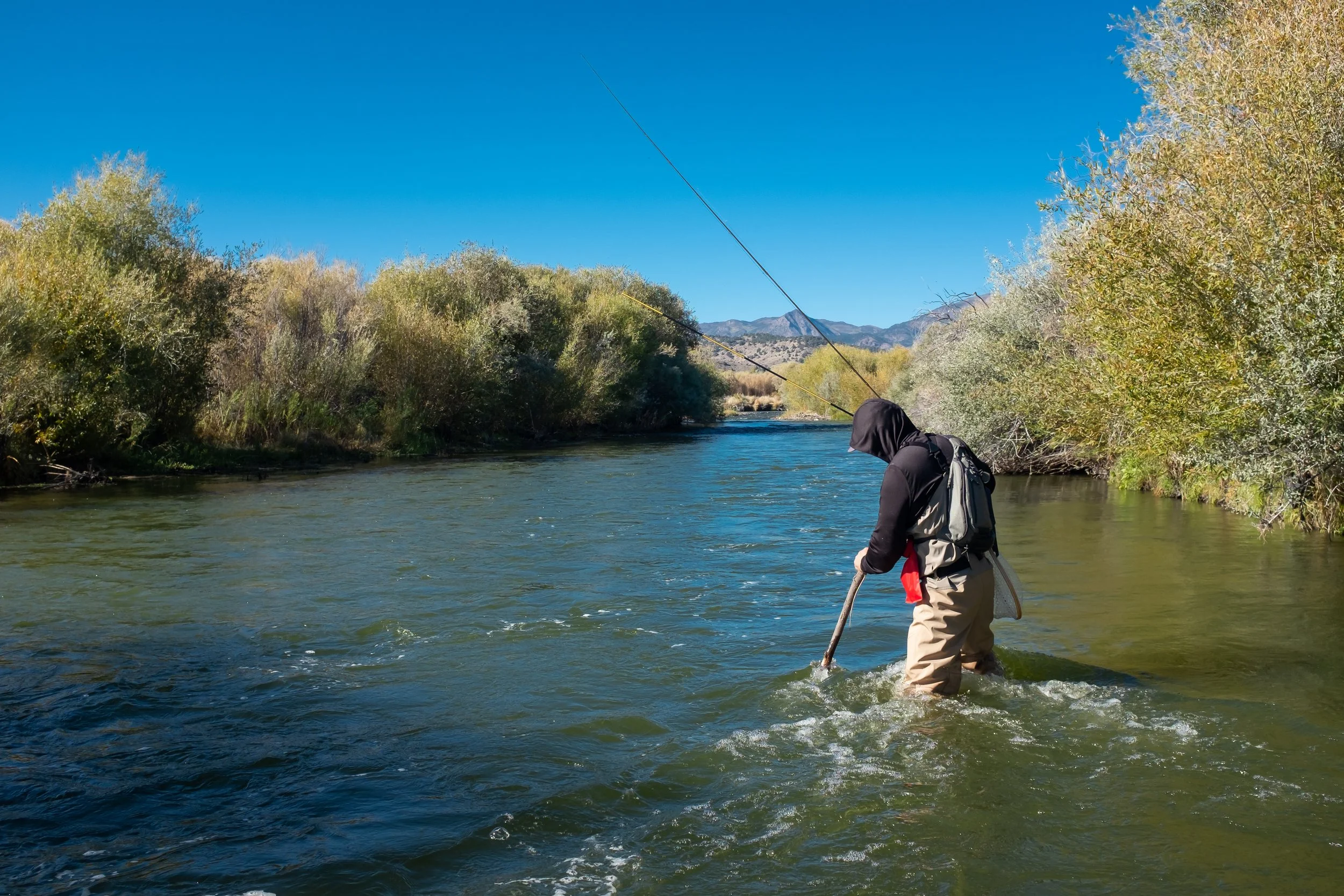The Walker Basin Conservancy invites water rights owners to consider selling their water rights through our confidential program.
Decades of reduced freshwater inflows into Walker Lake have resulted in an increase in lake salinity to the point that the lake can no longer support its native fish and wildlife populations. To address this, the Walker Basin Conservancy works to increase inflows through a voluntary market-based program. We work with willing sellers to acquire water rights for the benefit of Walker Lake.
To date the Conservancy has acquired 57% of the water needed to restore Walker Lake’s fishery.
“Thinking about selling your water or land can feel uncertain. Here at the Conservancy, we have multiple ways for you to get more information and even estimates of what your water rights are worth while protecting your confidentiality.”
FAQs
fill out Inquiry form
estimate your water’s value
REPORTS AND TRANSPARENCY
Current Water Flow Conditions
Contact Us
FAQs about Walker Basin Conservancy Water Right Purchasing
Why does the Conservancy purchase water rights?
Decades of reduced freshwater inflows have resulted in a decline of the lake’s volume and an increase in lake salinity, which today threaten to cause its complete ecological collapse. Salinity content, known as Total Dissolved solids (TDS), increases in Walker Lake from the following sources: Walker River in-stream flows, groundwater inflow, salts carried by the wind and salts moving upward into the lake from lake-bottom sediments. Walker Lake salinity levels change primarily based on the amount of water in the lake (U.S. Geological Survey, 1995). Our goal is to increase natural flows in the Walker River to restore and maintain Walker Lake to a long-term TDS average of 12,000 mg/L, which is where indicator species such as the Lahontan cutthroat trout will once again be abundant in Walker Lake.
Do I have to sell my land and water rights together?
No. The Conservancy is primarily interested in buying water rights and can assist landowners in developing a management plan if they want to keep their land.
Can I sell a portion but not all of my water rights?
Yes. It is common to only sell a portion of water rights, especially if some water is needed for other purposes, including agricultural production.
Can I donate my water rights to benefit Walker Lake?
Yes. The Conservancy accepts appropriate water donations to help accomplish its mission.
Can I lease my water rights to the Conservancy?
Currently, the Conservancy’s priority is only to purchase and own water rights from willing sellers.
What is the process for selling my water rights?
All water purchases are voluntary, from willing sellers that contact Walker Basin Conservancy. When contacted by an interested seller, we work with the seller to understand their water rights portfolio. If we are interested in an acquisition, a valuation will be provided from which to begin negotiations. Multiple factors go into whether the water will eventually be purchased, including any transferability issues, plans for the land once the water is removed, and agreement on purchase terms. Once negotiations are complete including, which portions of which water rights will be included and contractual details, we will prepare a Purchase and Sale Agreement. After closing the transaction, we will apply to transfer the water rights to instream flow.
How does the Conservancy determine pricing for water rights?
Water rights are valued internally and by a third-party appraiser based on reliability and anticipated water deliveries using historical data. Data from water rights deliveries in the Walker Basin from 1978-2018 are used to estimate how much water (called reliable water) can be expected from the paper water right (called face value water) and each right (water type, amount and priority year, if applicable). Water right purchase prices paid by the Conservancy must pass an annual audit showing that that prices are reasonable and justifiable by federal standards.
What happens to my land after I sell my water rights?
The Conservancy works with willing sellers to determine the best course of action for land from which some or all the water has been acquired for instream use. In some cases, the land may be kept in agricultural production by using water from other sources and/or lowering the water footprint. If agricultural production on the land is not desired or possible, the Conservancy develops a revegetation plan for each acquisition to abate any weed and/or dust issues. Each revegetation plan is developed to create and maintain a landscape of native vegetation adapted for climatic and other local variables.
Why are working agricultural lands also important to protecting Walker Lake?
Agriculture is an integral part of the Walker Basin and supports a thriving economy and productive community. The Conservancy strives to support agricultural production while restoring Walker Lake. The Conservancy works with willing sellers to ensure that agricultural lands either stay in production through a partial sale of water rights or water leasebacks, or that the land is returned to a natural state through planting of native grasses and shrubs where appropriate.
Where does the funding come from to buy water rights?
Desert Terminal Lakes (DTL) funding was appropriated by Congress through the U.S. Bureau of Reclamation to provide water to at-risk natural desert terminal lakes in the Great Basin, including the Walker Basin Restoration Program.
Inquiry Form
All Inquiries Are Confidential
Read Prior To Filling Out Form
The Conservancy invites water right owners interested in exploring the sale of their water rights to submit a confidential inquiry to the Conservancy with the Preliminary Water Right Review Form below.
All inquiries are confidential and voluntary. The Conservancy only purchases water from willing sellers who contact the Conservancy directly or through this Request for Water.
When contacted by an interested seller, the Conservancy works with the seller to understand their water rights portfolio. Conservancy staff completes the initial due diligence of the water right at no cost to the water right owner and will identify whether the water rights being offered will meet the Conservancy’s needs. If so, the Conservancy will make an initial offer based on fair market value. The Conservancy will not acquire water rights if negotiations fail to result in a mutually agreed upon purchase and sale agreement.
Submission of this Inquiry Form will NOT commit owners to pursuing a transaction with the Conservancy and does NOT constitute a formal offer from the Conservancy to purchase the offered Water Right. All Inquiries are confidential. The Conservancy will not discuss individual water rights with any person or entity without the owner’s permission.
Water Right Eligibility Criteria:
- Must have a good history of use
- Decreed diversion rate with a minimum of 1.0 cfs
- Storage rights greater than 300-acre feet
- Cannot be on the Division Engineer’s abandonment list
- No conditional water rights
- No groundwater or spring rights
- Water Right Point of Diversion and Place of use must be located in Nevada
- Locally adapted native plants are self-sustaining. As much as possible in our projects, we try to use seed collected from plants grown within the Walker Basin, because these plants are adapted to our local environment. They are more likely to survive our freezing winters and hot, dry summers. Most importantly, locally grown native plants often do not require supplemental irrigation after they have become established in the landscape. By considering elevation, precipitation, and soil type, you can carefully choose native plants that will sustain themselves in a particular area.
- Native plants benefit wildlife. Native plants, pollinators, and other wildlife have coevolved (where multiple species reciprocally influence each other’s evolution) for thousands of years, creating intricate relationships between plants and animals. Non-native plants that evolved in other regions often provide lower quality habitat and do not support native wildlife as well. Some non-native plant species also become invasive and dominate the landscape, reducing habitat diversity, which in turn reduces wildlife diversity.
- Many native plants in the Walker Basin have cultural value and provide medicinal and culinary benefits.
Please fill out and submit the Preliminary Water Right Review Form below if you are potentially interested in selling your water rights. If you have any questions or need assistance completing the form, please contact Carlie Henneman by email at carlene.henneman@walkerbasin.org or by phone 775-463-9887 ext. 106.







